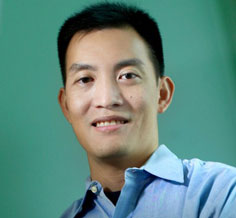What sets Weill Cornell apart from other institutions?
One of the key factors I find that sets Weill Cornell apart is the integration of fundamental and translational research opportunities.
What do you feel are the strengths of the Weill Cornell Graduate School?
Weill Cornell Graduate School offers outstanding research opportunities with highly engaged faculty.
What do you enjoy most about working with graduate students?
Somewhere around the second or third year, every student in my lab seems to go through an inflection point where they progress from running experiments and interpreting results to proposing great new ideas that I'd never have thought of. Most of the best ideas in our lab have come from the students.
What is your proudest accomplishment at Weill Cornell thus far? What do you hope to achieve in the future?
I received the Dean's Award for Excellence in Teaching and Mentoring in 2013. Teaching and mentoring the next generation of scientists is tremendously important and rewarding to me. I'm always excited to see students' enthusiasm and appetite for new knowledge, both in the classroom and in the lab. Teaching has also impacted my own research program quite directly, as preparing lectures has helped me to identify new avenues for investigation.
Our research program is focused on developing new small molecule inhibitors as both biological probes and potential therapeutics in cancer and infectious diseases. We use the complementary approaches of diversity-oriented synthesis and rational drug design to identify these inhibitors through multidisciplinary collaborations with biologists. We have developed several anti-infectives that are in various stages of preclinical development, including a novel antibiotic for tuberculosis. We are eager to see how far we can advance these programs in the future to address major problems in global public health.
What is your favorite part about teaching at Weill Cornell?
Integration of chemistry in a biomedical research environment gives us unique scientific opportunities to do fundamental research and to have real impacts on important biomedical problems. The environment is also highly dynamic, vibrant and collaborative, something that is quite rare. Our students are phenomenal in their dedication, commitment, and enthusiasm for science.
What one piece of advice would you give to applicants?
Of course, you need strong grades and scores. But beyond that, it's important to establish a strong undergraduate research background, ideally focused on one project for at least a year, preferably more. When you come to interview, be sure you understand both the experimental details and the big picture significance of your projects.

